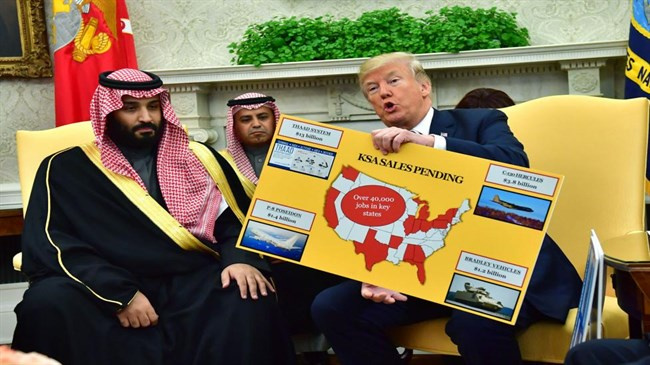Saudi Arabia dumps Trump; Democrats shouldn't be fooled

By Ali al-Ahmed
Saudi Crown Prince Mohammed bin Salman is nothing if not an opportunist. Donald Trump's election in 2016 was a godsend for the kingdom. Former president Barack Obama and the Democrats had become personae non grata on account of their overtures to Iran, neuralgia over the war in Yemen and criticism of human rights.
The crown prince moved quickly to embrace the new administration. Trump's first overseas visit was to Riyadh. Presidential son-in-law Jared Kushner and MBS soon became best friends. Billions of dollars in arms sales followed, as well as numerous vetoes of congressional legislation that would have placed limits on US military support for Saudi Arabia.
And then coronavirus happened.
Over the course of March and April the twin shock of collapsing oil demand and Saudi production increases pushed the price of West Texas Intermediate crude into negative territory. US shale producers from North Dakota to Texas started going bankrupt, and layoffs began to hit hard in an industry that employs 2.5 million Americans.
Saudi Arabia went from strategic partner to pariah, almost overnight. Leading Republican senators from the oil patch began pushing for tariffs and punitive sanctions. In a phone call with MBS on April 2, Trump reportedly "threatened the complete withdrawal of American troops from the kingdom if the Saudis didn't slash oil production."
On top of that, Trump's poll numbers began to tank, and all of a sudden, it looked like the much maligned Democrats could soon be back in power.
All of which helps explain why Saudi Arabia is turning its back on its erstwhile Republican patrons and pivoting to court its former nemesis on the other side of the aisle. The Saudi government recently engaged two new firms to strengthen ties with the Democratic establishment. Meanwhile, its existing army of lobbyists has turned their focus to blue state leaders. FARA filings show that Democratic heavyweights at Saudi Arabia's lobbyists of record, Brownstein, Hyatt, Farber, Shreck and Hogan Lovells, have been mounting a full-on assault to appeal for support from party luminaries.
Saudi Arabia's new charm offensive should be a matter of concern for two reasons. It sends a signal to the Republican establishment that the rats are leaving a sinking ship. And it should not fool the Democrats into believing that Riyadh is any less of a danger – or more of a friend – than it has been in the past.
This is not a question of playing both sides of the political fence, as is customary in the Washington influence game. Saudi Arabia's opportunistic about-face reconfirms what dissidents like me and others have been saying for years: The kingdom cannot be trusted. MBS has lied about his involvement in the murder of journalist Jamal Khashoggi. Despite protestations to the contrary, Saudi Arabia continues to propagate its brand of Wahhabi extremism. And it spies on and imprisons American citizens.
Repeating the old policies of accommodating the Saudis has not worked well for any administration. It has not only undermined US credibility and values, but has also cost America lives and treasure.
The Republican Party is only now discovering what those of us who know the kingdom all too well have learned from a lifetime of dealing with the Al Saud dynasty: Today's friend is tomorrow's castaway, and vice versa.
MBS made a bet on Trump. That bet is not paying off, and he is now putting his money on the Democrats. Hopefully, they will heed the lessons of the past and not repeat the GOP's mistake. King Salman repeatedly snubbed Obama and secretary of state, John Kerry.
No amount of lobbyist PAC contributions or slick talking points can mask the fundamental reality of Saudi perfidy. The kingdom will run to whomever it thinks can help them. Democrats should not be fooled. And Republicans should be ashamed for having been duped.
Source: UPI

